BIG STORY
Minimum Wage: Mass Sacking Imminent, FG Warns As Labour Disowns Agreement
Published
1 year agoon
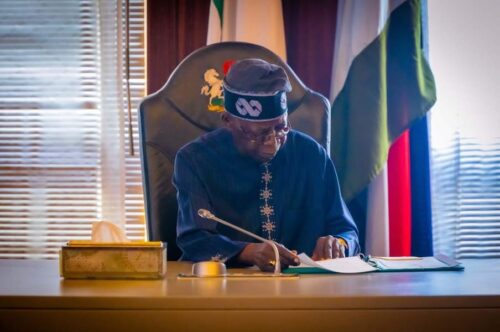
The Federal Government on Wednesday chastised organised labour to consider the broader economic implications of its push for an unrealistic higher national minimum wage.
The admonition was delivered by Mohammed Idris, Minister of Information and National Orientation. Idris warned that the N250,000 minimum salary proposed by labour may damage the economy, cause a mass layoff of workers, and endanger the wellbeing of Nigerians.
The labour unions, on the other hand, denied President Bola Tinubu’s assertions that a deal had been reached on the new national minimum wage during his Democracy Day speech on Wednesday.
Acting President of the Nigeria Labour Congress, Prince Adewale Adeyanju, said as of the time negotiations ended on June 7, no agreement had been reached by the Tripartite Committee on the National Minimum Wage.
Adeyanju is acting on behalf of the NLC president, Joe Ajaero, who is attending an International Labour Organisation conference in Geneva, Switzerland.
Tinubu drew the ire of the unions after stating that his administration would soon submit an executive bill to the National Assembly to codify the agreements reached in the minimum wage negotiations between Labour, the private sector, the states and the Federal Government.
The parties had engaged in prolonged talks for weeks with the unions insisting on N250,000 minimum wage while the Federal Government and the Organised Private Sector offered N62,000.
However, the state governors said they would not be able to sustain any minimum wage higher than N60,000.
Dismissing the offers made by the Federal Government and the OPS, the labour unions said they would not negotiate what they described as ‘starvation wage.’
- N62,000 not acceptable
The Assistant General Secretary of the NLC, Chris Onyeka, said Labour would not accept the latest offer of N62,000 and the N100,000 proposal made by some individuals and economists.
This was as the NLC President, Joe Ajaero, said the unionists were waiting on the President to consider Labour’s proposal.
But speaking at the opening of the 2024 Synod of the Charismatic Bishops Conference of Nigeria in Abuja on Wednesday, the information minister emphasised the imperative of a realistic wage system that safeguards against mass retrenchment while addressing workers’ needs.
Idris restated the government’s dedication to reassessing the minimum wage but cautioned against demands that could disrupt the economy.
He stated, “As I have repeatedly said, the Federal Government is not opposed to the increase of wages for Nigerian workers but we keep on advocating for a realistic and sustainable wage system for the workers – a wage system that will not undermine the economy, lead to mass retrenchment of workers and jeopardise the welfare of about 200 million Nigerians.
“We want the labour unions to understand that the relief that Nigerians are expecting, and that they fully deserve, will not come only in the form of an increase in wages.”
He highlighted the ongoing efforts to alleviate the cost of living, citing initiatives like the Presidential Compressed Natural Gas programme aimed at reducing transportation expenses by 50 per cent.
While advocating wage increases, Idris stressed the importance of holistic relief measures beyond salary adjustments, urging Labour to recognise the significance of programmes like the CNG initiative in enhancing citizens’ purchasing power.
“It will also come as an effort to reduce the cost of living and to ensure that more money stays in the pockets of Nigerians. And this is where programmes like the Presidential CNG initiative come in.
“By replacing or complementing petrol usage with CNG, that programme alone will cut transportation costs by as much as 50 per cent,” he claimed.
The minister called on religious leaders to assist in raising public awareness about government initiatives and efforts.
- Religious leaders
He stressed the crucial role of the clergy in disseminating information about available opportunities and the government’s ongoing efforts.
“As a government, we need your support, advice, and feedback,” Idris stated.
“Very importantly, we need you to be aware of the efforts being made and the challenges being faced so that you can help us communicate these to your congregations and the general public,” he added.
The minister highlighted the influential platforms of religious leaders, noting their potential to enlighten Nigerians on their rights, responsibilities, and the economic opportunities provided by the policies under the President’s Renewed Hope Agenda.
The agenda, he noted, aimed to promote economic rebirth, strengthen national security, boost agriculture and food security, and transform infrastructure and transportation.
“Information and awareness are critical, and this is where our religious leaders come in. You have very influential platforms that can enlighten Nigerians on their rights, responsibilities, and the abundance of economic opportunities being thrown up by the policies and programmes being implemented under the Renewed Hope Agenda of President Bola Tinubu,” he explained.
In his remarks, the National President of the Charismatic Bishop Conference, Archbishop Leonard Kawas, reaffirmed the organisation’s unwavering support for Tinubu’s administration, emphasising their commitment to collaborative efforts to realise the nation’s collective aspirations.
- ‘No agreement yet’
In their reaction to the President’s national broadcast, Adeyanju disagreed with Tinubu’s statement that his administration negotiated in good faith and with open arms with Organised Labour on the new national minimum wage.
Tinubu during his broadcast stated, “In this spirit, we have negotiated in good faith and with open arms with organised Labour on a new national minimum wage. We shall soon send an executive bill to the National Assembly to enshrine what has been agreed upon as part of our law for the next five years or less.
“In the face of labour’s call for a national strike, we did not seek to oppress or crack down on the workers as a dictatorial government would have done. We chose the path of cooperation over conflict.
“No one was arrested or threatened. Instead, the labour leadership was invited to break bread and negotiate toward a good-faith resolution.
“Reasoned discussion and principled compromise are hallmarks of democracy. These themes shall continue to animate my policies and interaction with the constituent parts of our political economy.”
But Adeyanju in a statement dismissed the President’s assertion, insisting that he might have been misled by his advisers, noting that two figures- N250,000 from Organised Labour and N62,000 from the government and the OPS- were arrived at and ought to have been submitted to Tinubu.
According to the NLC official, anything to the contrary is not only doctored but won’t be accepted by Labour.
The congress maintained its stance on the N250,000 minimum wage, rejecting the government’s offer of N62,000 as grossly inadequate.
The statement read in part, “The NLC would have expected that the advisers of the President would have told him that we neither reached any agreement with the Federal Government and the employers on the base figure for a National Minimum Wage nor on its other components.
“Our demand still remains N250,000 only and we have not been given any compelling reasons to change this position which we consider a great concession by Nigerian workers during the tripartite negotiation process.
“We are therefore surprised at the submission of Mr President over a supposed agreement. We believe that he may have been misled into believing that there was an agreement with the NLC and TUC.
“There was none and it is important that we let the President, Nigerians and other national stakeholders understand this immediately to avoid a mix-up in the ongoing conversation around the national minimum wage.”
Adeyanju alleged that the labour leaders were intimidated by security agencies during the minimum wage talks.
“Fully armed soldiers surrounded us while we were in a negotiation with the government and despite denials; recent statements by senior officials of the government reaffirmed our fears contrary to the assurances by the government.
“However, we remain assured that the President’s democratic credentials will come to the fore in favour of Nigerian workers and masses,’’ he expressed optimism.
According to the union, the Democracy Day celebration was an opportunity for the President to demonstrate his love for Nigerian workers and the masses by shunning the advice that may be coming from ‘’those whose intentions were continuously focused on hurting Nigeria’s poor and struggling workers.’’
He appealed, “Mr President should not allow these individuals and groups to sabotage his promise of lifting Nigerian workers out of poverty.
“The President’s advisers obviously did not tell him the truth that the leaders of the trade unions were intimidated and harassed. It is therefore important that Mr President understands that we were threatened severally by his operatives perhaps without his consent.
“Series of media propaganda calculated to intimidate and harass us were, and, are still being waged against the trade unions by senior officials of this government. “
The NLC noted that there was no agreement as regards the duration of the Minimum Wage Act.
“It is also important that Mr President should know that most of his officers are working round-the-clock to set up the leadership of congress and the trade unions.
“We never agreed on a five-year duration of the Minimum Wage Act, though we acknowledge that the President mentioned five years or less.
“We also agreed that inflation should be pegged at a level for a certain amount to be agreed as minimum wage. This is to bring clarity to what the report should contain.
“Once again, we reiterate that it will be extremely difficult for Nigerian workers to accept any national minimum wage figure that approximates a starvation wage. We cannot be working and yet remain in abject poverty.
“We seek justice, equity, and fairness for all Nigerians, and this we hope would also drive the actions of Mr President who promised a Living Wage to Nigerian workers. This is an opportunity to show that he listens to Nigerians as he promised,” the labour movement said.
- OPS speaks
Also commenting on the presidential broadcast, the Nigerian Association of Chambers of Commerce, Industry, Mines, and Agriculture, stated that no consensus had been reached on the national minimum wage.
The NACCIMA President, Dele Oye, who is part of the 37-member tripartite committee, said the panel was still in the middle of negotiation, faulting the contradictory statements being made on the talks.
“No agreement has been reached with Labour; however, it is wrong to make a press statement in the middle of negotiations apart from appealing to all parties involved to work harder to resolve outstanding issues, as the impasse is already creating uncertainty in the ability of businesses to make decisions,” he admonished.
In January, the government inaugurated the tripartite committee on the national minimum wage.
The committee was tasked with the responsibility of recommending a new national minimum wage for Nigerian workers.
Over the past few months, the federal and state governments, organised labour, and representatives of the private sector have been deliberating on a new minimum wage for workers.
However, the demand by organised labour regarding the minimum wage has yet to be met.
On June 3, the Nigeria Labour Congress and Trade Union Congress embarked on an indefinite nationwide strike to protest against the government’s inability to meet their minimum wage demand.
Twenty-four hours later, the labour unions “relaxed” the strike by one week.
Credit: The Punch
You may like
-
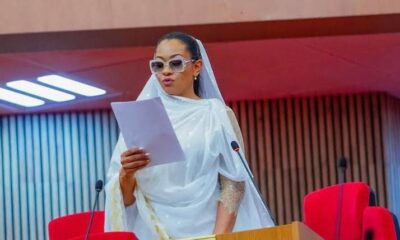

Senate Replaces Natasha Akpoti With Aniekan Bassey As Diaspora Committee Chair
-


Tunji-Ojo Meets US Envoy Over New Visa Policy, Says FG Will Curb Overstay By Nigerians
-


Diplomatic Tensions: Federal Government Pushes Back As US, UAE Tighten Visa Rules
-
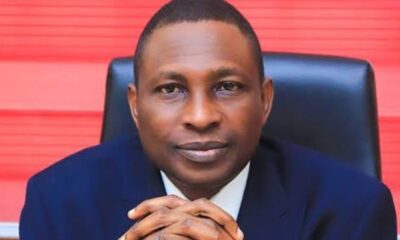

EFCC Urges National Assembly To Criminalise Unexplained Wealth
-
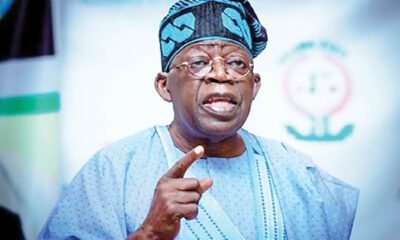

Nigeria’s Economy Improving Under President Tinubu — Information Minister Mohammed Idris
-


I Was Blacklisted For Rejecting Sexual Advances — Actress Moji Afolayan
BIG STORY
Senate Replaces Natasha Akpoti With Aniekan Bassey As Diaspora Committee Chair
Published
6 hours agoon
July 10, 2025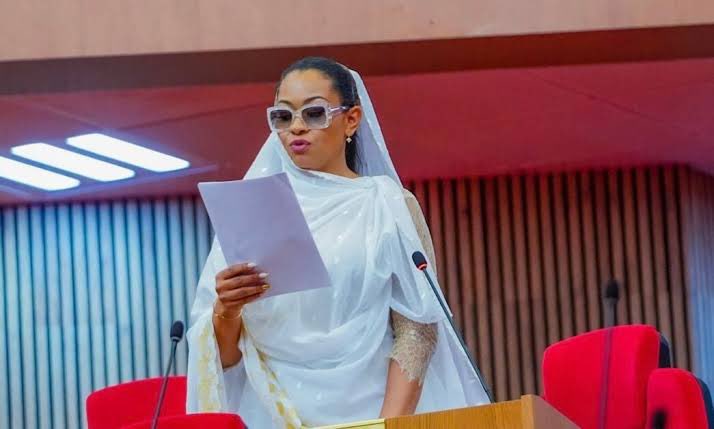
Senate Sacks Senator Natasha Akpoti-Uduaghan as Diaspora Committee Chairman, Replaces Her with Akwa Ibom Senator
The Senate, on Thursday, removed Senator Natasha Akpoti-Uduaghan from her position as Chair of the Committee on Diaspora, naming Senator Aniekan Bassey, representing Akwa Ibom North-East, as her replacement.
The announcement was made during plenary without any official explanation for the change. Senator Bassey is expected to take over the responsibilities immediately. Senator Akpoti-Uduaghan, who represents Kogi Central, was appointed Chair of the Diaspora and NGOs Committee on “February 4, 2025”, after being removed as Chair of the Committee on Local Content. This latest move represents another minor reshuffle in the Senate committee leadership.
BIG STORY
Tunji-Ojo Meets US Envoy Over New Visa Policy, Says FG Will Curb Overstay By Nigerians
Published
10 hours agoon
July 10, 2025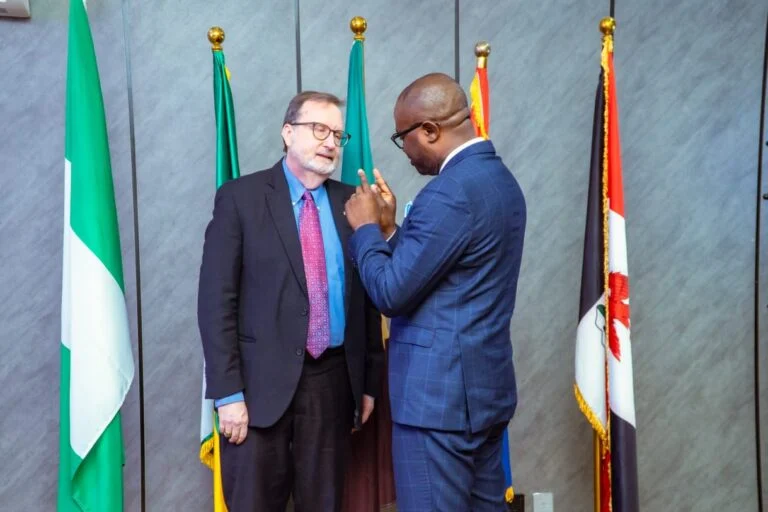
Olubunmi Tunji-Ojo, the minister of interior, held a meeting on Wednesday in Abuja with Richard Mills, the United States ambassador to Nigeria.
Also present at the meeting were Kemi Nanna Nandap, comptroller-general of the Nigeria Immigration Service (NIS), and Magdalene Ajani, permanent secretary in the ministry of interior.
In a statement, Tunji-Ojo noted that the “constructive meeting” addressed the recently implemented visa procedures introduced by the US government for Nigerian citizens.
The minister stated that the US ambassador shared “valuable insights into the revised protocol and its alignment with established practices to uphold the integrity of the visa process”.
According to the statement, “The ambassador described the new e-visa policy of the Nigeria Immigration Service as an innovation intended to streamline and enhance the application process for foreign travellers into the country.”
It further mentioned that the Ministry of Interior, NIS, and the US Mission in Nigeria have agreed to deepen cooperation, focusing on compliance with visa rules and encouraging responsible travel behaviour among Nigerians.
The minister added, “Our government under the leadership of President Bola Tinubu (GCFR) will continue to ensure strict compliance across the board in key areas, including secure travel documents, ensuring the issuance of secure travel documents with verified traveller identities.”
Other focus areas highlighted include “Visa overstay management: Implementing measures to limit overstays by travellers on US visas” and “Information sharing: Sharing relevant security and/or criminal record information to protect public safety.”
Earlier on Tuesday, the US embassy in Nigeria had announced significant modifications to its visa policy for Nigerians, reducing the validity and entry allowance for most non-immigrant and non-diplomatic visas.
The embassy explained that most of the revised visas will now allow single entry and be valid for only three months.
BIG STORY
Diplomatic Tensions: Federal Government Pushes Back As US, UAE Tighten Visa Rules
Published
12 hours agoon
July 10, 2025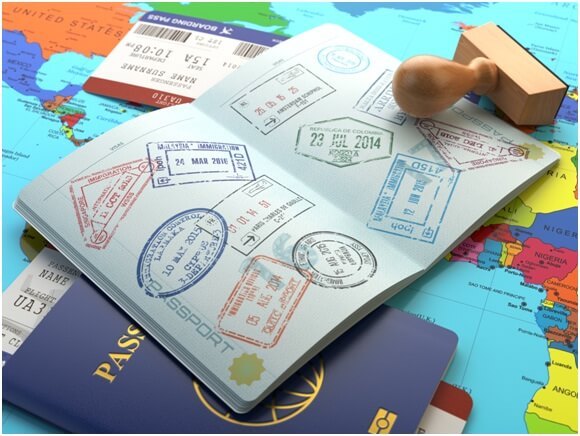
The Federal Government has expressed concern over the recent decision by the United States to impose tighter visa restrictions on Nigerian citizens, describing the move as disproportionate and calling for “reconsideration in the spirit of mutual respect and cooperation.”
This development follows the United Arab Emirates’ introduction of stricter entry requirements for Nigerian travellers, which includes a complete ban on transit visa applications.
According to updated directives from Dubai immigration, Nigerians between the ages of 18 and 45 are no longer eligible for tourist visas unless accompanied, while those aged 45 and above must provide a six-month personal bank statement with a minimum monthly balance of $10,000 before being considered for a visa.
On Wednesday, the British High Commission in Abuja also announced changes to the United Kingdom’s immigration process for Nigerians applying for study and work visas.
The US Department of State in Abuja announced on Tuesday that, effective July 8, 2025, most non-immigrant and non-diplomatic visas issued to Nigerians will now be valid for only three months and limited to a single entry. This announcement prompted the FG’s response.
The US Government’s revised visa reciprocity schedule for Nigeria limits the validity of specific non-immigrant visa categories—including “B1/B2” (business and tourism), “F” (student), and “J” (exchange visitor)—to three months and restricts them to a single entry.
The spokesperson for the Ministry of Foreign Affairs, Kimiebi Ebienfa, confirmed to The PUNCH that the government is examining the new directive and its possible effects.
“We are assessing the new policy and its necessary implications. The government will respond soon, after due consultation with relevant stakeholders,” Ebienfa said.
In a statement issued on Wednesday by the Ministry of Foreign Affairs, signed by Ebienfa, the FG said it viewed the new policy with “concern and keen interest,” particularly in light of the historically cordial relations between the two nations.
“The attention of the Federal Government of Nigeria has been drawn to the recent decision by the United States Government to revise its visa reciprocity schedule for Nigerian citizens, limiting the validity of non-immigrant visas including B1/B2, F and J categories to three months with single entry.
“The Federal Government views this development with concern and keen interest, particularly given the longstanding cordial relations and strong people-to-people ties between our two countries.
“The decision appears misaligned with the principles of reciprocity, equity, and mutual respect that should guide bilateral engagements between friendly nations,” Ebienfa said.
According to the statement, the policy change would have a broad impact on Nigerians, affecting students seeking education in the US, professionals involved in legitimate business, and families visiting loved ones.
The government emphasised that the restriction could hamper cultural and educational exchanges that have long been a foundation of US-Nigeria relations.
“While acknowledging the sovereign right of every country to determine its immigration policies, Nigeria respectfully urges the United States to reconsider this decision in the spirit of partnership, cooperation, and shared global responsibilities.
“Diplomatic engagements are ongoing, and the Ministry of Foreign Affairs remains committed to pursuing a resolution that reflects fairness and upholds the values of mutual interest,” Ebienfa noted.
The ministry also confirmed that diplomatic engagements are underway, adding that Nigeria remains committed to seeking a resolution that reflects fairness and upholds the values of mutual interest.
FG, US meet
Minister of Interior, Olubunmi Tunji-Ojo, led an FG delegation that held a meeting with the US Ambassador to Nigeria, Richard M. Mills Jr., on Wednesday as the FG moved to resolve the issue.
He stated on her X handle, “I held a constructive meeting with the US Ambassador Richard M. Mills Jr. today (Wednesday), to discuss the recently introduced visa procedures for Nigerian nationals.
The meeting, attended by the Permanent Secretary, Dr. Magdalene Ajani; Comptroller General of the Nigeria Immigration Service, Kemi Nanna Nandap, aimed at strengthening ties between Nigeria and the US through a well-structured visa framework.
“The discussions centred on visa reciprocity, with Ambassador Mills Jr. providing valuable insights into the revised protocol and its alignment with established practices to uphold the integrity of the visa process.
“The Ambassador described the new e-visa policy of the Nigeria Immigration Service as an innovation intended to streamline and enhance application process for foreign travellers into the country.”
He added, “The Ministry of Interior, the Nigeria Immigration Service, and the US Mission in Nigeria agreed to strengthen collaboration, emphasizing adherence to visa regulations and promoting responsible travel practices among Nigerian citizens.
Our government under the leadership of President @officialABAT Tinubu (GCFR) will continue to ensure strict compliance across board in key areas including: 1. Secure travel documents: Ensuring the issuance of secure travel documents with verified traveller identities. 2. Visa overstay management: Implementing measures to limit overstays by travelers on US visas. 3. Information sharing: Sharing relevant security and/or criminal record information to protect public safety.”
According to the US Embassy, the revised visa terms are part of the Department’s global visa reciprocity process. The initiative was designed to align visa policies with international standards and security requirements.
The embassy stated that the new guidelines applied only to visas issued on or after July 8 and that existing visas would remain valid until their expiration.
The embassy also explained the reasoning behind the policy, emphasising the need to protect the integrity of the US immigration system.
Among the benchmarks the US considers essential are the issuance of secure travel documents, effective management of visa overstays, and information sharing on criminal records and other security-related data.
According to the embassy, the US Mission is working with Nigerian authorities to meet these benchmarks.
Despite the stricter regulations, the US government reiterated its commitment to maintaining a strong bilateral relationship with Nigeria.
In light of the changes, the US government urged Nigerian travelers to observe all visa conditions.
Diplomats react
Commenting on the development, a retired diplomat, Ambassador Rasheed Akinkuolie, described the measure as temporary and subject to review.
Akinkuolie called for a reciprocal response by the Nigerian government and urged that such reciprocity should be adjusted once the US revises its stance.
He said, “The policy of USA to reduce non-immigrant visa to three months, single entry is temporary, and subject to review. Nigeria should also reciprocate in like manner. And when the policy is reviewed by the other party, Nigeria should also do the same.
“Government delegations and diplomats of both countries travelling to USA, and Nigeria are not affected by this policy, which is an indication that government to government relationship between the two countries is still strong.
“Normally, anyone travelling to USA to visit family members, or as a tourist, should not stay for more than three months, except there is intention to ‘Japa’.”
A foreign affairs analyst Charles Onunaiju linked the new visa restrictions to broader US political trends, especially under the Trump administration.
Onunaiju argued that rather than confront the US directly, Nigeria should adopt a broader diplomatic strategy.
He said, “First, these measures are to be expected and the issue of restrictive immigration to the US was a major policy platform of the Mr. Trump campaign for the presidency. It is part of the Trump administration inverse nationalisms that can be discerned across his entire policy platforms.
“A frontal pushback will not offer much help but a deliberate policy to diversify and consolidate partnerships across the world would offset most of the effects of the US nationalist resurgence.
“Visa restrictions, punitive tariff impositions, upending traditional diplomatic practices and disruptive political mannerisms would undergird Washington international behaviours in the coming years and therefore both traditional partners like Nigeria should get ready for more of Washington twists and turns.”
Tougher entry conditions
Meanwhile, according to new directives from Dubai immigration, Nigerians aged 18 to 45 will no longer be eligible for tourist visas unless accompanied.
For those aged 45 and above, visa applicants must present a personal six-month bank statement showing a minimum monthly balance of $10,000 (or its naira equivalent).
Travel agents said the new policy was expected to drastically reduce travel from Nigeria to Dubai, a top destination for business and tourism.
“For Nigerian nationals, please bear in mind that an applicant aged 18 to 45 years travelling alone is not eligible for the TOURIST VISA CATEGORY.
“An applicant who is 45 years or above must provide a Single Nigerian personal bank statement for a period of the last six months, with each month’s end balance reflecting a minimum ending balance of USD 10,000 or its naira equivalent.
“Kindly note that the above points must be taken into consideration before sending your applications with other existing documents such as hotel reservation, data page, etc,” the notification read.
UK introduces eVisas
The British High Commission in Abuja on Wednesday announced that starting from 15 July 2025, most applicants will begin receiving digital eVisas instead of the traditional visa stickers in their passports, a statement from the BHC revealed.
The new policy will only apply to applications submitted on or after 15 July 2025. Those who submit their applications before this date will still follow the existing procedure, which includes submitting their passport at a Visa Application Centre and receiving a vignette.
According to the statement, “From 15 July 2025, most individuals applying to enter the UK on study or work-related visas will no longer receive a physical visa sticker (vignette) in their passport.
“Instead, successful applicants will be issued an eVisa, a secure, online record of their immigration status. This change marks a major step in the UK Government’s transition to a modern, digital immigration system.
“This change applies only to study or work visa applications submitted on or after 15 July 2025. Applicants who apply before 15 July will continue with the current process, including leaving their passport at the Visa Application Centre and receiving a vignette. Visit visas applications will continue to receive the visa vignette sticker for the time being.”
Importantly, applicants must still attend a Visa Application Centre to provide biometric information.
The statement further stated that once their visa is approved, they will receive an email from UK Visas and Immigration with a decision and instructions to set up a UKVI account in order to access their eVisa.
“Despite the removal of the vignette for study or work visas, all applicants must still attend a Visa Application Centre to provide their biometric information as part of the visa processing procedure.
“Once a decision is made on their visa application, applicants will receive an email from UK Visas and Immigration with the outcome and instructions to create a UKVI account, to access their eVisa,” the statement added.
The Chargé d’Affaires at the British High Commission in Abuja, Gill Obe, said, “We’re making it easier and faster for Nigerians to travel to the UK. From 15 July 2025, most people applying for study or work visas will get a digital eVisa instead of a visa sticker in their passport.
“This is a further big step to a fully digital UK immigration system, making the process more secure, more efficient, and more convenient for students, professionals, and families.”
She also noted that not all applicants would be affected by the new system immediately.
“However, if you’re applying as a dependant, like a spouse or child, of someone who is studying or working in the UK or if you are applying for a visitor visa, you’ll still receive a visa vignette sticker in your passport for the time being,” she added.
The High Commission clarified that eVisas have already replaced Biometric Residence Permits for individuals granted leave for more than six months. Holders of a UKVI account can use the “View and Prove” service to share their immigration status with third parties, such as employers or landlords in England.
To obtain an eVisa, applicants must; Apply online via the official UK government website (gov.uk); Attend a Visa Application Centre to submit biometrics; Take their passport home the same day if a vignette is not required; Follow the decision letter instructions, including creating and linking a UKVI account if necessary.
Opposition blames FG
While reacting to the tighter visa conditions on Nigerians, the opposition Labour Party accused the FG of incompetence and failure to address the deteriorating state of the country.
Speaking in an exclusive interview with The PUNCH, the Deputy National Chairman, Labour Party, Dr Ayo Olorunfemi, expressed disappointment at Nigeria’s growing international isolation, which he attributed to poor governance and a failure to provide opportunities for citizens.
“It is not just about the visa bans. Every country is moving forward, but Nigeria is stuck — in fact, we are regressing,” Olorunfemi said. “These countries can’t afford to wait for us. If we refuse to make progress, they will act in their own interest, and that is what we are witnessing now.”
He noted that the restrictions were not necessarily targeted at Nigerians but reflected a broader global response to Nigeria’s unchecked population growth, lack of development, and increasing emigration crisis.
“Our people are leaving en masse in search of greener pastures. The ‘Japa’ wave is a direct result of government failure to care for its citizens. This is why you hear some Nigerians saying they would rather be slaves abroad than free citizens here,” he lamented.
Olorunfemi warned that Nigeria’s large and growing population, if not properly managed, will continue to place pressure not just on the country but on the international community, especially well-organized developed nations.
“You can’t expect them to keep their borders open when we have refused to fix our own house. If you don’t raise your children properly, they become strays and the world will treat them as such,” he said.
He also criticised the political class, describing them as “gangs of criminals” engaged in power struggles, with little regard for the welfare of the masses.
“Rather than rebuild the nation, what we see are criminal gangs wrestling to hijack power from other criminal gangs, while the people look on helplessly, as if they have no other choice.”
The LP chieftain urged the government to urgently address the root causes of the mass exodus and international embarrassment, including insecurity, economic hardship, and poor leadership.
Also, the New Nigeria Peoples Party stated that the new restrictions reflected how Nigeria was viewed by the international community.
Speaking (with The Punch), the party’s National Publicity Secretary, Ladipo Johnson, described the development as a wake-up call for the country.
He stated, “Well, the posture of foreign countries towards us and the trend we’re beginning to see is indicative of how they perceive us as Nigerians and how valuable or otherwise they feel that we are, or our patronage.
“It is a shame that things seem to be degenerating for us on the international stage. It is a wake-up call for the government, the federal government — especially in view of the fact that Mr. President, since resuming office, has not appointed ambassadors. And I am not sure how he is selling his agenda to our partners around the world, not just the Western world.
“If his agenda is sold and our partners understand where he is going administratively, it might help the outlook that they have for the country. On the other hand, they might have seen where things are going, and they might view things negatively.
“Whichever way, we feel it is a wake-up call for the government to put its house in order. And this is not good at a time when the government is telling us that it is bringing in foreign direct investment.”
The restrictions also sparked reactions online with a member of the Peoples Democratic Party, Dele Momodu, writing on his Instagram handle, “BREAKING: The United States halts long-term visas for Nigerians. This comes on the heels of attending and actively engaging in the BRICS summit. The ramifications of President Tinubu’s limited diplomatic experience and strategic vision are becoming increasingly evident. Meanwhile, ECOWAS has fractured and diverged, marking a significant turning point in regional cooperation.”
Also, Bashir Ahmad, an aide to ex-President Muhammadu Buhari, stated on X, “I am of the opinion that the recent review of U.S. visa policy on Nigeria, reducing the 5-year multiple entry visa to just 3 months single entry, is not solely about reciprocity. Rather, it appears to reflect growing US discomfort with Nigeria’s increasing global realignment, particularly the warm reception we are receiving from the BRICS.
“Nigeria is charting its course, forging strategic partnerships that serve our national interest. Our President, Bola Tinubu’s successful outing at the BRICS Summit in Brazil sent a strong message. We are Nigeria and we will be alright.”
Reacting, Special Adviser to President Bola Tinubu on Policy Communication, Daniel Bwala, said the Federal Government is reviewing the United States’ visa reciprocity policy and taking steps to address the concerns that led to the latest development.
According to The Punch, Bwala, on Wednesday, dismissed claims that the visa reciprocity issue stemmed from poor diplomatic relations between Nigeria and the US.
He maintained that Nigeria enjoys strong diplomatic ties with the US, citing the fact that Nigeria was not among the countries affected by the travel restrictions recently announced by US President Donald Trump.
Bwala said, “It is not really about poor governance or poor diplomatic relations with the US. President Donald Trump is reviewing relations with all countries of the world. You recall that when he recently placed travel restrictions, Nigeria was not included.
“The reciprocity requires review, and we are taking steps to rectify issues. No problems at all. We are in a good relationship with the US.”
Most Popular
-

 BIG STORY2 days ago
BIG STORY2 days agoJUST IN: ASUU Suspends Strike As Federal Government Pays June Salaries
-

 BIG STORY3 days ago
BIG STORY3 days ago“JAPA”: US Embassy Begins Screening Nigerian Students’ Social Media Accounts
-

 BIG STORY1 day ago
BIG STORY1 day ago“JAPA”: Canada Increases Minimum Proof Of Funds To N17m For Immigrants
-

 BIG STORY1 day ago
BIG STORY1 day agoUK Introduces eVisas For Nigerian Study, Work Visa Applicants
-

 BIG STORY3 days ago
BIG STORY3 days agoJUST IN: Several Passengers Injured As Commercial Bus Somersaults On Lagos Third Mainland Bridge [PHOTOS]
-
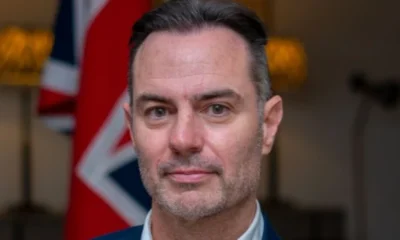
 BIG STORY4 days ago
BIG STORY4 days agoUK Grants Duty-free Access To 3,000 Nigerian Products Under New Trade Scheme
-
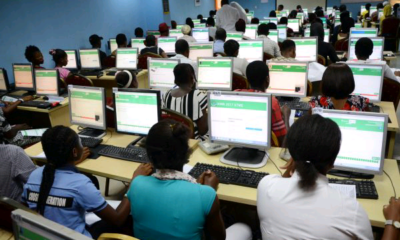
 BIG STORY2 days ago
BIG STORY2 days agoJUST IN: JAMB Sets 150 As Cut-Off Mark For Universities
-
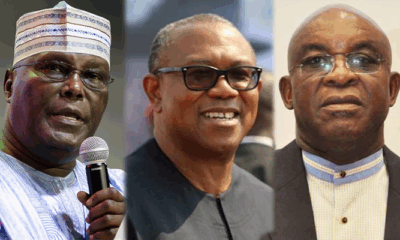
 BIG STORY1 day ago
BIG STORY1 day agoRoad To 2027: David Mark Cautions Atiku, Obi As Federal Government Slams Coalition Chiefs









